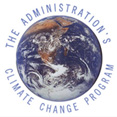|
Science News
- The National Climatic Data Center released data near the end of
1999
showing that in the last quarter-century, the rate of warming has been
more than double that of the 20th
century average, and since the
mid-1970's, the global temperature has risen at a rate of about 0.35
degrees per decade, or 3.5 degrees per century. (Complete text of a front
page New York Times story about the findings is attached.)
-
The National Academy of Sciences released a major new study on January 13,
which was reported on by the Washington Post, LA Times, CNN, CBS
and other
outlets. The study found that the warming trend over the past two decades
"…is undoubtedly real and is substantially greater than the average
rate
of warming during the 20th century."
The report also downplayed a
long-standing dispute over temperature data (while ground monitors have
shown a sharp increase in Earth's temperatures, satellite and weather
balloon observations have shown little or no warming), noting that while
this discrepancy cannot yet fully be explained, it "in no way invalidates
the conclusion that the Earth's temperature has been rising."
- 1999 will be the fifth warmest year on record, according to a British
Meteorological Office study released December 15, 1999. Seven of the 10
hottest years on record occurred in the 1990's, which was the hottest
decade of the millennium, the report said. Furthermore, the report
suggested a "high probability" of 2000 being even warmer, as the cold
Pacific (La Nina) warms again naturally.
- New satellite data released by NASA January 19, 2000 shows that part
of
the Pacific Ocean may be undergoing a cooling which could influence U.S.
weather patterns over the next years and even decades. This newly
identified climate pattern, known as Pacific-Decadal Oscillation (PDO), is
a natural oscillation of northern hemisphere Pacific Ocean temperatures
that occurs over decades, similar to the international El Nino-La Nina
cycle in the tropical Pacific. The research suggests that the U.S.
entered the "cool" phase of the PDO (similar to the La Nina phase) about 2
years ago. The tendency of this phase is to cool some regions of the
earth, and while this could serve to "mask" or "dampen" global warming
signals, it is not evidence that global warming is not occurring. For
example, 1998 and 1999 set records as the warmest and 5th warmest years
this century during the same period that scientists believe a "cool" PDO
phase may have been starting.
Industry and Technology Update
-
Following the lead of Ford in December 1999, DaimlerChrysler Corp. this
January withdrew from the Global Climate Coalition (GCC), the major
business lobbying group opposed to the Kyoto climate treaty. This leaves
GM as the only American carmaker still in the GCC. BP/Amoco, Sunoco and
Shell all left the GCC within the last two years.
-
In first week of January, a coalition of 42 religious and environmental
organizations in 17 states unveiled "Campaign ExxonMobil" (CEM), an effort
aimed at pressuring ExxonMobil to reform corporate practices that
contribute to global warming, to acknowledge that human activity is
causing global warming, and to quit anti-Kyoto lobbying groups such as the
Global Climate Coalition. The religious and environmental groups' primary
tactic is shareholder resolutions. In addition to ExxonMobil, they are
also targeting GM, Cinergy, Goodyear, Duke Power, CSX, Southern Co.,
Chevron, Texaco, and Allegheny Energy.
- At the Detroit Auto Show the first week of January 2000, virtually
every
major manufacturer unveiled prototype hybrid cars that get better than 70
mpg. Ford's entry, the Prodigy, is "a family car that gets nearly 80 mpg
without sacrificing performance or functionality," according to company
documents. GM's Precept has similar qualities. Both were developed under
the Partnership for a New Generation of Vehicles program. Chrysler is
slated to display their entry later this year.
- A new hybrid gas and electric car which gets more than 60 mpg arrived
at
Honda dealers in the U.S. in December, 1999, the first such vehicle priced
under $20,000 to be available to American consumers. Drivers fill it with
unleaded gas and an electric motor is charged by the car's brakes so it
never needs to be plugged in — one of the big drawbacks to cars that
are
entirely electric. Toyota will release a similar vehicle in 2000, selling
for $17,000 and getting 66 mpg.
-
Cargill Inc. and Dow Chemical announced in mid-January a $300 million
program for full-scale commercial production of a new kind of plastic made
from plants instead of petroleum. The new product is being called
"Natural Plastic."
International Developments
- The World Bank in mid-January announced the creation of a fund to
finance
a market for greenhouse gas emissions. Four governments — Finland,
Norway,
Sweden and the Netherlands — and nine companies have committed $85
million
so far to the fund, which will begin operating in April 2000. Reports in
the Washington Post and Wall Street Journal speculated that
the initiative
reflects the World Bank's concern about the vulnerability of poor, low
lying nations to coastal flooding as a result of global warming.
- France unveiled a program to fight global warming containing 96
measures,
including an energy consumption tax on industries due to take effect in
2001, proposals to encourage vehicles to economize on fuel, the
development of new public transport, reduction of energy consumption in
buildings, and the promotion of research into renewable energy sources.
The proposal, announced the week of January 17 also includes a domestic
emissions trading system, despite the European Union's strong criticism of
trading systems.
Recent Editorials
- January 9, 2000 — The Washington Post
"Warming to Reality" (complete text attached)
- January 15, 2000 — The Courier-Journal
"Global Warming"
- Headline: January 16, 2000 — The Detroit News
"Global Warming?"
- January 17, 2000 — The Indianapolis Star
"Still Not a Crisis"
- January 17, 2000 — The Washington Post
"More Hot News"
- January 18, 2000 — The Atlanta Constitution
"Global Warming Facts Ignored at Our Peril"
Other Media Coverage
- CBS News aired six separate global warming stories over
three
nights the
week of January 10-16 featuring clips from President Clinton's January
11th statement at the Grand Canyon, two
interviews with Dr. James Baker
of NOAA, and an interview with White House Chief of
Staff John Podesta. All the stories emphasized that global warming
science is becoming conclusive, and included impacts as diverse as farming
problems in the Central Valley of California and increased incidence of
jellyfish blooms worldwide. On Wednesday, January 12, Dan Rather began
the CBS lead story with this statement: "A CBS News Exclusive: a new study
finds global warming is real and getting worse as the White House plans to
unveil an ambitious new program to fight it."
- NBC Nightly News, devoted an "In-Depth" segment on January 4,
2000 to the
latest global warming data, indicating that since the mid-1970's global
temperatures have risen .35 degrees Fahrenheit a decade. The following
week, NBC ran two additional stories emphasizing the increasing certainty
in the science of global warming.
|



![]()